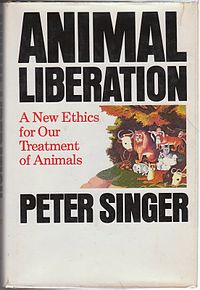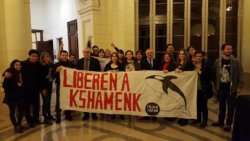Grassroots efforts come in many sizes
A couple weeks back, I spent the weekend in Princeton, New Jersey with some of the most effective animal advocates in the world at a symposium organized and co-sponsored by Animal Charity Evaluators, the Princeton University Center for Human Values, and the Princeton Animal Welfare Society. The purpose of the symposium was to highlight new research—especially social science research—that could be of use to the animal advocacy movement.
As you may already know, ACE designated the Nonhuman Rights Project a “Standout Charity” in 2015 because of our work to achieve legal personhood and rights for nonhuman animals—which, in ACE’s view, “could be the most promising avenue for the proper consideration of nonhuman animals in our society.” I am thrilled to say that NhRP remains an ACE “Standout Charity” for 2016.
That said, the NhRP does not fit neatly into the ACE mold, as ACE acknowledges. Most of its top charities can be evaluated in some sense according to rigorous data analysis, particularly regarding the effectiveness of grassroots efforts (including leafleting, social media, and website-based outreach) aimed at reducing the demand for meat and animal products.
In contrast, the NhRP has worked primarily through litigation in pursuit of what ACE rightly calls “a long-term goal,” and our plaintiffs are currently limited to individual captive great apes, elephants, dolphins, and whales. These factors make it difficult to quantitatively analyze the impact of what we do, which is one of many reasons we welcome healthy debate about the function and necessity of personhood and rights, such as can be found on ACE’s blog.
 As an extension of the kind of discussions ACE fosters online, the symposium talks were, unsurprisingly, excellent and informative. The symposium began with a keynote address from one of the giants of the movement—and a personal hero of mine—Peter Singer, the author of the classic Animal Liberation. NhRP founder and President Steven M. Wise credits Animal Liberation with opening his eyes to the atrocities facing animals and convincing him to switch the focus of his law practice to nonhuman rights, all the way back in 1980. The work of both Peter and Steve motivated me, in turn, to go to law school, and so it is always a true privilege to find myself working alongside these pioneers. Other compelling talks included topics such as making the movement more racially and culturally diverse, harnessing breakthroughs in cognitive science, and using public opinion polling to hone outreach.
As an extension of the kind of discussions ACE fosters online, the symposium talks were, unsurprisingly, excellent and informative. The symposium began with a keynote address from one of the giants of the movement—and a personal hero of mine—Peter Singer, the author of the classic Animal Liberation. NhRP founder and President Steven M. Wise credits Animal Liberation with opening his eyes to the atrocities facing animals and convincing him to switch the focus of his law practice to nonhuman rights, all the way back in 1980. The work of both Peter and Steve motivated me, in turn, to go to law school, and so it is always a true privilege to find myself working alongside these pioneers. Other compelling talks included topics such as making the movement more racially and culturally diverse, harnessing breakthroughs in cognitive science, and using public opinion polling to hone outreach.
On the whole, I left the symposium feeling renewed faith in the intellectual rigor of the animal advocacy movement as well as a great sense of shared purpose. As animal advocacy organizations, we are all, I believe, generally on many roads to, ultimately, the same end—what Peter Singer pithily calls “animal liberation.”
Defending NhRP’s mission & methods
That said, over the course of the weekend, I found myself occasionally caught off guard by an undercurrent of skepticism of the NhRP on the part of a handful of attendees. “You’d have just as much luck throwing copies of Speciesism out of a helicopter” is one line apparently in circulation among some NhRP naysayers in the animal advocacy movement.
We understand that it’s not always easy for non-attorneys to recognize victories or defeats in our litigation campaigns. As Steve has said, our lawsuits aren’t considered victories or defeats solely by their outcomes, but by what we secure through the lawsuits—for example, the New York Supreme Court’s recognition that we had standing to bring a lawsuit directly on behalf of chimpanzees Hercules and Leo without having to allege any injury to our own human interests. Another such difficulty in terms of the public perception of our work lies in the fact that we brought a lawsuit backed by rigorous legal arguments and facts which we simply then failed to win. Recall, though, that Justice Jaffe’s generally favorable opinion in the Hercules and Leo case that we brought in Manhattan ended with her dismissal of our claim for habeas corpus “for now.”
One source of hostility or resistance to the NhRP’s mission and work is our focus on a limited number of species at the beginning stages of our litigation campaign. It is understandable that many animal advocates would focus their attention on the plight of farmed animals; these make up the vast majority of the animals harmed by humans and human institutions and receive little mainstream attention. The thinking follows that in order to do the most good for the most animals with the limited resources we have, we ought to focus on those areas that are the most neglected, tractable, and impactful.
That makes sense, and I wholeheartedly support these efforts. But I’m convinced that we stand to make monumental strides forward for all nonhuman animals by undermining the reigning legal paradigm, as old as civilization itself, by which all nonhuman animals exist as “things” under the law—as mere instruments for human ends and desires.
Seeking legal personhood for nonhumans is catching on
The work of the NhRP is already bubbling into the wider world in ways that are only beginning to become obvious.
In 2014, for example, the Oregon Supreme Court cited the work of the NhRP, among other developments, as a sign of a greater cultural respect for the lives of animals in the landmark case of State v. Fessenden/Dicke, in which it held that an officer of the state was justified in entering upon private property without a warrant to attend to an emaciated horse in plain view and that the constitution did not bar this action (prior to this ruling the “emergency exemption” to the warrant requirement was reserved for humans in danger in Oregon).

In Argentina, the work of the NhRP has served as a roadmap for ongoing habeas corpus litigation on behalf of chimpanzees, orangutans, and other animals confined to zoos, with a judge stating in October of 2016 that a chimpanzee, Cecilia, is entitled to the rights befitting her status as a “non-human legal person.” In May, the Senate of Argentina bestowed a “Diploma of Honor” upon Steve in honor of his and the NhRP’s work.
We have been thrilled to see the powerful reception to Unlocking the Cage as it makes its way around the globe and readies for premiere on HBO on Feb. 20, 2017. We hope it can become the “next Blackfish,” and continue to bring attention to the plight of nonhuman animals who suffer because of human greed and the need to begin recognizing legal personhood for at least some nonhuman animal species.
Whether we’re speaking of the NhRP or animal advocacy, much remains uncertain, and we’ll have to continue to be flexible and responsive to changing political and cultural climates. But I’m confident when I say that creating the legal precedent of personhood and genuine rights will be a major leap forward and go far towards building a new architecture of thought and action, which—finally—takes account of nonhuman animals’ fundamental interests to the benefit of all.
 The 2016 EAA Research Symposium was organized and co-sponsored by Animal Charity Evaluators, a 501(c)(3) non-profit organization working to find and promote the most effective ways to help animals, the Princeton University Center for Human Values, and the Princeton Animal Welfare Society. The event was held on November 12th and 13th, 2016 at Princeton University. Researchers, professors and graduate students across various disciplines who are conducting or planning work which has practical application to the animal advocacy movement presented on these projects, with particular emphasis on the social sciences. Presentations revealed cutting edge research as well as avenues for further research, highlighting areas of greatest research need. The event also provided an overview of Effective Altruism as it applies to animal advocacy, as well as providing information on the state of the advocacy movement.
The 2016 EAA Research Symposium was organized and co-sponsored by Animal Charity Evaluators, a 501(c)(3) non-profit organization working to find and promote the most effective ways to help animals, the Princeton University Center for Human Values, and the Princeton Animal Welfare Society. The event was held on November 12th and 13th, 2016 at Princeton University. Researchers, professors and graduate students across various disciplines who are conducting or planning work which has practical application to the animal advocacy movement presented on these projects, with particular emphasis on the social sciences. Presentations revealed cutting edge research as well as avenues for further research, highlighting areas of greatest research need. The event also provided an overview of Effective Altruism as it applies to animal advocacy, as well as providing information on the state of the advocacy movement.